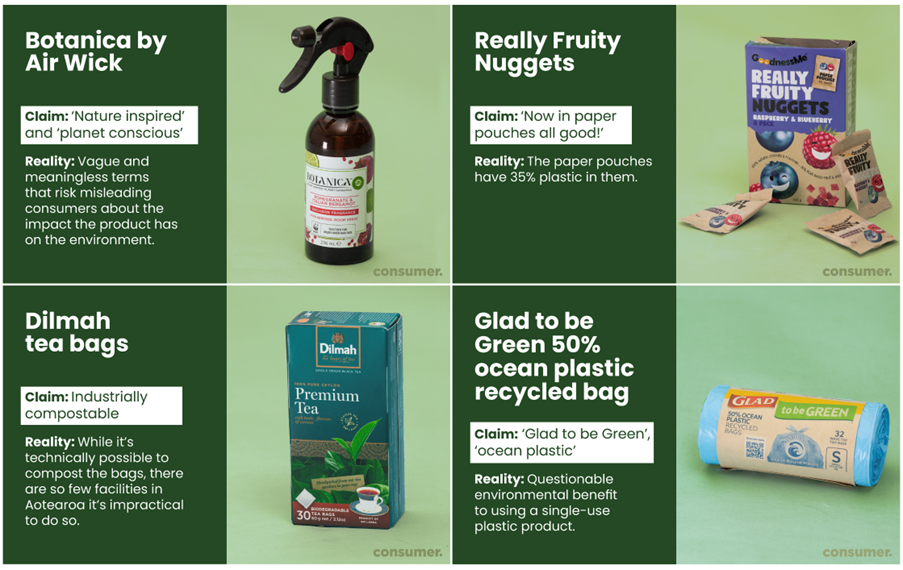
Te Whanganui-a-Tara – A Consumer NZ investigation into the green claims on a basket of supermarket goods has found greenwashing rife in Aotearoa.
Consumer’s shopping basket included a planet conscious air freshener, industrial compostable teabags, ocean plastic bags, crisps and herbs in compostable packs, and eco-friendly cotton buds.
All nine items looked at featured claims that were either unsubstantiated or risked misleading the shopper in some way, Consumer NZ’s head of research and advocacy Gemma Rasmussen says.
“Often green products are sold at a premium to conscientious shoppers, but it can be very difficult to debunk what is real, and what is spin.
“Consumer’s sentiment tracker data shows almost half of New Zealanders are mindful of sustainability when shopping for groceries.
“Our investigation has not only highlighted how easy it is for manufacturers to use terms that are vague and meaningless, insinuating environmental kudos, but how easy it is for such products to be stocked on New Zealand shelves due to lack of enforcement.”
The magazine watchdog found multiple compostability claims that did not meet best practice guidelines. Consumer is calling for an independent investigation of greenwashing claims across multiple industries in New Zealand, and the introduction of new regulations to tackle dodgy ‘green’ claims.
Some of the dubious supermarket item labels:
Proper Crisps
Some Proper Crisps are sold in compostable bags but if those bags are thrown into landfill, they won’t break down any quicker than other packaging. Proper crisps’ compost claim does not meet best practice guidelines.
Botanica Air Wick room spray
This room spray claims to be planet conscious and nature inspired.
“We think these claims could lead shoppers to think this product is better for the environment than alternative air fresheners,” Rasmussen says.
A spokesperson for the company said the term ‘nature inspired’ is a subjective term, rather than scientific. It refers to sourcing essential oils ‘responsibly’ and using ingredients sourced from nature.
Dilmah tea
Consumer raised concerns about the biodegradable – industrially compostable claims on Dilmah’s teabags. There are very few industrial compost facilities in New Zealand which means it’s not practical for most New Zealanders to send their used tea bags to a composter.
“Given biodegradable is slapped on the front of the box, many shoppers could end up throwing the tea bags into landfill.”
In response to Consumer’s concerns, Dilmah agreed to change the labelling of its biodegradable teabags until facilities for industrial composting are more widely available in New Zealand.
Earth smart aqua wipes
“We think the term earth smart is another example of a vague and meaningless claim, which risks misleading consumers into thinking the wipes are better for the environment than they actually are.”
“A claim of biodegradability must be accurate. With the presence of poo, these baby wipes need to go in the bin, just like every other brand on the market.”
Glad to be Green 50 percent ocean plastic recycled bags
These bags are made with 50% ocean plastic.
“At first glance a shopper may think an ‘ocean plastic recycled bag’ is made from plastic recycled from the ocean. But that’s not the case here.”
Ocean plastic is plastic collected within 50km of the shoreline in communities with no formal waste management not from the ocean.
Goodness me really fruity nuggets
Consumer questioned the product’s ‘now in paper pouches all good’ claim.
The paper pouches consist of 65 percent Kraft paper and 35 percent CPP which is a plastic.
“It’s misleading to say the packaging is paper when in fact, it’s partly plastic.”
Following this issue being brought to its attention the company has decided to remove the claim about paper from its packaging.

